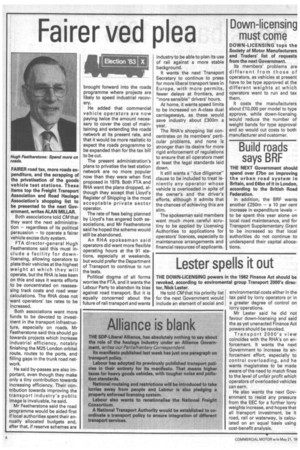Fairer ved plea
Page 6

If you've noticed an error in this article please click here to report it so we can fix it.
FAIRER road tax, more roads expenditure, and the scrapping of the privatisation of the goods vehicle test stations. These items top the Freight Transport Association and Road Haulage Association's shopping list to be presented to the next Government, writes ALAN MILLAR.
Both associations told CM that they want the next administration — regardless of its political persuasion — to operate a fairer vehicle excise duty system.
FTA director-general Hugh Featherstone said this must include a facility for downlicensing, allowing operators to plate their vehicles at the highest weight at which they will operate, but the RHA is less keen on this and says it wants efforts to be concentrated on reassessing track costs and road wear calculations. The RHA does not want operators' tax rates to be increased.
Both associations want more funds to be devoted to investment in the transport infrastructure, especially on roads. Mr Featherstone said this should go towards projects which increase industrial efficiency, notably finishing the M25 London orbital route, routes to the ports, and filling gaps in the trunk road network.
He said by-passes are also important, even though they make only a tiny contribution towards increasing efficiency. Their contribution towards improving the transport industry's public image is invaluable, he said.
Mr Featherstone said the road programme would be aided first if local authorities spent their annually allocated budgets and, after that, if reserve schemes are brought forward into the roads programme where projects are likely to speed industrial recovery.
He added that commercial vehicle operators are now paying twice the amount necessary to cover the cost of maintaining and extending the roads network at its present rate, and that it would be more realistic to expect the roads programme to be expanded than for the tax bill to be cut.
The present administration's plans to privatise the test station network are no more popular now than they were when first proposed in 1979. Both FTA and RHA want the plans dropped, although they accept that Lloyd's Register of Shipping is the most acceptable private sector operator.
The rate of fees being planned by Lloyd's has angered both associations, and Mr Featherstone said he hoped the scheme would still be abandoned.
An RHA spokesman said operators did want more flexible operating hours at the 91 stations, especially at weekends, but would prefer the Department of Transport to continue to run the tests.
Political dogma of all forms worries the FTA, and it wants the Labour Party to abandon its bias against road transport. But it is equally concerned about the future of rail transport and wants industry to be able to plan its use of rail against a more stable background.
It wants the next Transport Secretary to continue to press for more liberal transport laws in Europe, with more permits, fewer delays at frontiers, and "more sensible" drivers' hours.
At home, it wants speed limits to be increased on A-class dual carriageways, as these would save industry about 000m a year.
The RHA's shopping list concentrates on its members' particular problems, and none is stronger than its desire for more rigid enforcement of regulations to ensure that all operators meet at least the legal standards laid down.
It still wants a "due diligence" clause to be included to treat leniently any operator whose vehicle is overloaded in spite of the owner's and the driver's efforts, although it admits that the chances of achieving this are slim.
The spokesman said members want much more careful scrutiny to be applied by Licensing Authorities to applications for operators' licences, especially to maintenance arrangements and financial resources of applicants.
























































































































